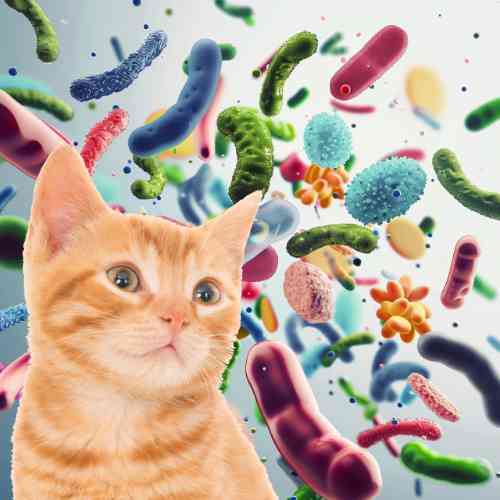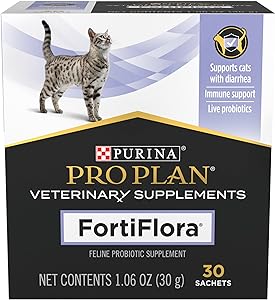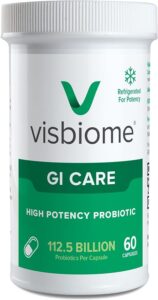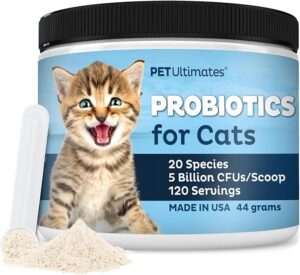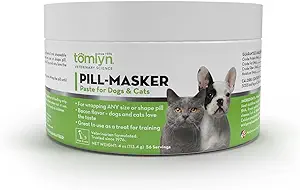What does probiotics do for a cat?
and which one is the best to give?
Probiotics, you hear more and more about them. But what exactly are probiotics and what effect do they have on your cat? In this article we explain what probiotics are. In which cases you should give them to your cat and which brands are best to use for specific problems. All our advice is based on scientific research. This way you can be sure that you are giving your cat the right remedy.
What does probiotics do for a cat?
Although much has been written and talked about it, many people are not entirely clear about what probiotics actually are. Probiotics are in fact just a bunch of bacteria that have a beneficial effect on the composition of the intestinal flora. Intestinal flora itself also consists of many bacteria and you are therefore adding a lot of extra healthy bacteria when you give your cat probiotics.
Because his intestines then contain a lot of good bacteria, the bad bacteria are expelled. That makes the intestinal wall healthier. This is proven, among other things, in the article Gut Probiotics and Health of Dogs and Cats: Benefits, Applications, and Underlying Mechanisms. And since a large part of the immune system in cats is formed in their intestines, probiotics indirectly ensure that the immune system suppresses diseases and medical problems. Your cat will become less likely to get sick and diseases that already exist have a better chance to heal.
Should cats take probiotics?
In principle, it is not necessary to provide a healthy and lively cat with probiotics. As long as you give him a good quality diet, the intestinal flora will make itself as healthy as possible. The intestinal flora will therefore contain many good bacteria and few bad bacteria. It is not necessary to get a different intestinal flora composition within a few days. However, sometimes there is a reason that your cat’s intestinal flora can’t make itself optimally healthy. Or something has happened that has completely thrown your cat’s intestinal flora out of balance. In that case, it is wise to give your cat probiotics. After all, you want him to become fit and healthy again as quickly as possible and to have less chance of getting sick. According to this study on probiotics in cats, it is wise to provide your cat with probiotics in the following situations:
- In the case of gastrointestinal problems such as diarrhea, abdominal pain, constipation or vomiting.
- If your cat gets ill relatively often compared to other cats of his age or if he has a reduced functioning of its immune system due to old age. For example, in the case of chronic cat flu, it is wise to give your cat probiotics to increase his immune system.
- In the treatment of gum inflammation and other problems in a cat’s mouth.
- After giving a course of antibiotics. These antibiotics will always affect the intestinal flora to a greater or lesser extent. Probiotics can replace the lost bacteria in the intestine.
- Although the research is still limited, it seems that giving your cat probiotics is also wise if you want him to lose weight or if he has liver problems or kidney problems.
Which probiotics are best for cats?
According to the study Microbiota and probiotics in canine and feline welfare from 2015 en Probiotics and Cat Health: A Review of Progress and Prospects from 2024, the following strains are particularly important for optimal intestinal function in cats:
- Saccharomyces boulardii: because of their ability to promote intestinal health by supporting and improving the existing intestinal flora. In addition, they stimulate the production of short-chain fatty acids (SCFAs), which promotes the health of the intestinal wall.
- Pediococcus acidilactici: beneficial effects on intestinal health and contributes to the production of useful substances such as short-chain fatty acids (SCFAs)
- Bacillus amyloliquefaciens SC06 and Bacillus subtilis B10: improve nutrient digestibility and stimulate the bodily mechanisms that improve the overall health of cats. They also reduce the occurrence of diarrhea.
- Lactobacillus acidophilus D2/CSL (CECT 4529): improves stool quality and increases the total number of Lactobacillus bacteria in your cat’s intestines. It reduces the presence of harmful E. coli.
- Enterococcus faecium SF68: ensures that diarrhea is prevented and ensures an improvement in intestinal health in cats.
- Lactobacillus reuteri NBF 2 DSM 32264: improves the quality of stool in healthy adult cats by increasing the number of Lactobacillus bacteria and reducing the amount of E. coli bacteria.
- Lactobacillus plantarum L11: can help improve lipid metabolism, reduce the amount of fats in your cat’s blood, and they increase the presence of Bifidobacteria.
- Lactobacillus salivarius: is mentioned as a typical component of the intestinal flora of cats and can help improve oral and intestinal health.
- Bifidobacterium animalis: contributes to healthy intestinal flora, especially in supporting digestion and promoting immunity.
So it mainly depends on what problem your cat has to choose a certain type of probiotic!
What are the possible side effects of probiotics in cats?
At the time of writing this article, there are many studies going on into the positive effects of probiotics. To date, we have not been able to find any studies that have investigated the adverse effects of probiotics. It is therefore wise to only use probiotics when there is a medical reason to do so and the benefits of the probiotics clearly outweigh the possible (as yet unknown) disadvantages.
As far as is known, no side effects have been described when using probiotics in cats. However, it is recommended to use the probiotics in the correct dosage. In the case of overdosing, your cat’s intestinal flora can become so unbalanced that you actually cause diarrhea or constipation.
When will probiotics start to work in your cat?
According to the article Prebiotics, probiotics and faecal transplants in cats: where are we now?, most cats with mild problems will see results within a few days of starting probiotics. For long-term problems, this can take a few weeks, such as constipation or chronic intestinal inflammation. In general, you will notice results in your cat within a month or two at the latest.
How often should I give probiotics to my cat?
How often you should give your cat probiotics depends on which product you have chosen to give your cat. In most cases, once a day is sufficient. In some cases, you should give the product twice a day. How often you should best administer the probiotics to your cat can be found on the package insert of the product you have purchased. Do you want to know before you buy it? In that case, all package inserts can usually be found on the internet.
Which probiotics are good for cats?
The product you choose depends on the problem your cat has. Below are the most common problems that respond well to the product we place there. So there is a good chance that your cat will also benefit from that product.
Cat probiotics for diarrhea or vomiting
The research on the treatment of diarrhea with Enterococcus faecium SF68 shows that for gastrointestinal complaints, such as diarrhea or vomiting, a cat benefits most from the strain Enterococcus faecium SF 68. This strain is used in the drug Fortiflora. That is why most veterinarians prescribe the probiotic Fortiflora when a cat suffers from diarrhea or vomiting.
Cat probiotics for constipation
In the case of constipation (or Megacolon) in your cat, a clear improvement can be noticed with SLAB51™. This is a mix of different strains including Streptococcus thermophilus, Lactobacillus acidophilus, Lactobacillus plantarum, and Bifidobacterium lactis. The positive effect of this product on constipation and megacolon in cats is evident from the article: Effects of a probiotic (SLAB51™) on clinical and histologic variables and microbiotaof cats with chronic constipation/megacolon: a pilot study. As far as we have been able to find, there is no product specifically for cats on the market that contains SLAB51™. However, you can use the product below for your cat that has been developed for human use.
Cat probiotics to enhance your cat’s immune system
In this case, according to the article on the immune system and probiotic strains in cats, Lactobacillus acidophilus and Bifidobacterium lactis are particularly important strains to use to improve your cat’s general resistance. In this case, it is best to use Proviable-DC Probiotics that contains these strains.
Probiotics for your cat after a course of antibiotics.
After a course of antibiotics, the following strains are especially important to give to your cat: Lactobacillus acidophilus, Bifidobacterium lactis, and Enterococcus faecium. This is evident from the two articles Probiotics and Cat Health: A Review of Progress and Prospects and Microbiota and probiotics in canine and feline welfare. These strains are processed in the product Pet Ultimate probiotics for cats.
Are probiotics tasty for animals?
The probiotics themselves are not tasty for cats. And since cats are quite picky about taste, flavorings are usually added to the probiotics to improve their absorption by your cat. However, some cats still do not like it. In that case, it is best to add the probiotics to wet food that your cat prefers. If that is not enough to convince your cat , you can try to very slowly increase the amount of probiotics. So give a little more with each dose. That way, your cat can get used to the taste. Is it important that your cat gets the full dose faster? Then you can also try whether your cat is willing to take the probiotics when it is put in an easypill.
Frequently Asked Questions about Probiotics for Cats (FAQ)
Can you give cats human probiotics?
The intestinal flora in humans has a different composition than the intestinal flora in cats. However, many probiotic strains appear to have beneficial effects in both humans and cats. So you can often give products for humans to cats. However, it is wiser to only use products that have been developed for cats. They contain the correct dosages and you can be sure that they are safe to use on your cat. In addition, these products usually contain flavourings that make cats more willing to eat them, unlike human products.
The exception is of course the visbiome suitable for human consumption that we recommended for cats with constipation. The research we cited showed that these probiotics also have a beneficial effect on cats with constipation.
Can a cat have too much probiotics?
There are not enough studies done on the negative effects of using probiotics in cats. As far as they know, the probiotic strains do not enter your cat’s body and only remain in the intestinal cavity. Therefore, the chance of overdosing is very low. It is known that if you give cats too high doses of probiotics, their existing intestinal flora can be disrupted, resulting in diarrhea. It is therefore better to stick to the dosage that the product advises you.
Can cat probiotics cause diarrhea?
Yes it can. When you give your cat probiotics this will affect the microbiome in his bowels. Sometimes the sudden change of the microbiome due to the probiotics can cause diarrhea in a cat. This is not a very common side effect of probiotics. In most cases of diarrhea due to probiotics the dosage of the probiotics you gave him was too high.
Are probiotics really necessary?
For a healthy cat it is not necessary to give probiotics. A good quality food should keep the existing intestinal flora of your cat optimal. Only in the case of medical problems is it wise to give probiotics to your cat.
Do Cats Need Probiotics After Antibiotics?
No, cats do not strictly need probiotics after a course of antibiotics. Even without probiotics, their intestinal flora will, with good nutrition, grow back into a strong whole. However, if you give probiotics, this will happen faster than without probiotics.
Do probiotics help cats with sensitive stomachs?
Yes. Probiotics might help your cat if he has a sensitive stomach. Due to the healthier microbiome in the intestine the immune system will improve and inflammation in the stomach and bowels will be suppressed.
Good luck!
Hopefully you have understood everything about probiotics for your cat and are now able to make the right choice which probiotic is best for your cat. We hope that he will soon regain healthy bowel function and that his general immune system will be optimal again soon. Good luck!
Sources used
- Zha M, Zhu S, Chen Y. Probiotics and Cat Health: A Review of Progress and Prospects. Microorganisms. 2024;12(6):1080. doi:10.3390/microorganisms12061080
- Grześkowiak Ł, Endo A, Beasley S, Salminen S. Microbiota and probiotics in canine and feline welfare. Anaerobe. 2015;34:14-23. doi:10.1016/j.anaerobe.2015.04.002
- Salavati S. Prebiotics, probiotics and faecal transplants in cats: where are we now? University Of Edinburgh Research Explorer. https://www.research.ed.ac.uk/en/publications/prebiotics-probiotics-and-faecal-transplants-in-cats-where-are-we. Published 21 februari 2024.
- Greuter T, Michel MC, Thomann D, Weigmann H, Vavricka SR. Randomized, Placebo-Controlled, Double-Blind and Open-Label Studies in the Treatment and Prevention of Acute Diarrhea With Enterococcus faecium SF68. Frontiers in Medicine. 2020;7. doi:10.3389/fmed.2020.00276
- Rossi G, Jergens A, Cerquetella M, e.a. Effects of a probiotic (SLAB51TM) on clinical and histologic variables and microbiota of cats with chronic constipation/megacolon: a pilot study. Beneficial Microbes. 2018;9(1):101-110. doi:10.3920/bm2017.0023
- Wang W, Dong H, Chang X, e.a. Bifidobacterium lactis and Lactobacillus plantarum Enhance Immune Function and Antioxidant Capacity in Cats through Modulation of the Gut Microbiota. Antioxidants. 2024;13(7):764. doi:10.3390/antiox13070764
- Europe PMC. Europe PMC. https://europepmc.org/article/pmc/pmc11205573.
- Marshall-Jones ZV, Baillon MLA, Croft JM, Butterwick RF. Effects of Lactobacillus acidophilus DSM13241 as a probiotic in healthy adult cats. American Journal Of Veterinary Research. 2006;67(6):1005-1012. doi:10.2460/ajvr.67.6.1005
- Fusi E, Rizzi R, Polli M, e.a. Effects of Lactobacillus acidophilus D2/CSL (CECT 4529) supplementation on healthy cat performance. Vet Record Open. 2019;6(1). doi:10.1136/vetreco-2019-000368
- Yang Q, Wu Z. Gut Probiotics and Health of Dogs and Cats: Benefits, Applications, and Underlying Mechanisms. Microorganisms. 2023;11(10):2452. doi:10.3390/microorganisms11102452
- Li Y, Ali I, Lei Z, e.a. Effect of a Multistrain Probiotic on Feline Gut Health through the Fecal Microbiota and Its Metabolite SCFAs. Metabolites. 2023;13(2):228. doi:10.3390/metabo13020228

